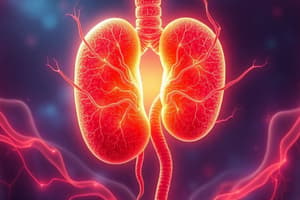Podcast
Questions and Answers
What is the most common cause of autoimmune primary adrenal insufficiency?
What is the most common cause of autoimmune primary adrenal insufficiency?
Isolated adrenal insufficiency (Addison's disease)
Name one medication that can decrease steroid synthesis, potentially leading to adrenal insufficiency.
Name one medication that can decrease steroid synthesis, potentially leading to adrenal insufficiency.
ketoconazole
Besides tuberculosis, name another infectious cause of primary adrenal insufficiency?
Besides tuberculosis, name another infectious cause of primary adrenal insufficiency?
Histoplasmosis, HIV, or CMV
What is the name of the syndrome associated with adrenal hemorrhage?
What is the name of the syndrome associated with adrenal hemorrhage?
What is the name of the condition that includes the triad of achalasia, Addison disease, and alacrima?
What is the name of the condition that includes the triad of achalasia, Addison disease, and alacrima?
What is a common cause of secondary adrenal insufficiency related to medication use?
What is a common cause of secondary adrenal insufficiency related to medication use?
What is the underlying cause of the patient's hypoglycemia in the case study?
What is the underlying cause of the patient's hypoglycemia in the case study?
What is the most likely cause of the child's adrenal insufficiency given his asthma treatment?
What is the most likely cause of the child's adrenal insufficiency given his asthma treatment?
What are the two main sub-organs of the adrenal gland?
What are the two main sub-organs of the adrenal gland?
What role do mineralocorticoids play in the body, and give an example of one?
What role do mineralocorticoids play in the body, and give an example of one?
How does cortisol affect blood glucose levels, particularly in fasting or starvation?
How does cortisol affect blood glucose levels, particularly in fasting or starvation?
Describe the typical pattern of cortisol levels during the day.
Describe the typical pattern of cortisol levels during the day.
What is the function of the renin-angiotensin system in relation to aldosterone?
What is the function of the renin-angiotensin system in relation to aldosterone?
What are the two main parts of the adrenal gland?
What are the two main parts of the adrenal gland?
What is the primary hormone produced by the adrenal medulla?
What is the primary hormone produced by the adrenal medulla?
Name the three zones of the adrenal cortex.
Name the three zones of the adrenal cortex.
What hormone is released by the juxtaglomerular apparatus in response to low renal perfusion?
What hormone is released by the juxtaglomerular apparatus in response to low renal perfusion?
Which hormone from the adrenal cortex is responsible for sodium retention and potassium wasting?
Which hormone from the adrenal cortex is responsible for sodium retention and potassium wasting?
What stimulates the release of CRH (corticotropin-releasing hormone)?
What stimulates the release of CRH (corticotropin-releasing hormone)?
What are the two main hormones released from the adrenal medulla?
What are the two main hormones released from the adrenal medulla?
What is the primary function of glucocorticoids, such as cortisol?
What is the primary function of glucocorticoids, such as cortisol?
At what time of day does cortisol secretion typically peak?
At what time of day does cortisol secretion typically peak?
What are the main effects of adrenaline on the cardiovascular system?
What are the main effects of adrenaline on the cardiovascular system?
Flashcards
Location of the Adrenal Gland
Location of the Adrenal Gland
The adrenal gland is located above the kidneys and is comprised of two main parts: the adrenal cortex and the adrenal medulla.
Hormones Secreted by the Adrenal Cortex
Hormones Secreted by the Adrenal Cortex
The adrenal cortex secretes steroid hormones, including glucocorticoids, mineralocorticoids, and androgens.
Glucocorticoids: Functions
Glucocorticoids: Functions
Glucocorticoids are hormones that affect many body systems, including maintaining cardiovascular function, regulating blood pressure, and enabling carbohydrate metabolism.
Mineralocorticoids: Functions
Mineralocorticoids: Functions
Signup and view all the flashcards
Renin-Angiotensin-Aldosterone System (RAAS)
Renin-Angiotensin-Aldosterone System (RAAS)
Signup and view all the flashcards
Adrenal Glands
Adrenal Glands
Signup and view all the flashcards
Adrenal Insufficiency
Adrenal Insufficiency
Signup and view all the flashcards
Addison's Disease
Addison's Disease
Signup and view all the flashcards
Adrenal Crisis
Adrenal Crisis
Signup and view all the flashcards
Congenital Adrenal Hyperplasia
Congenital Adrenal Hyperplasia
Signup and view all the flashcards
Cushing Syndrome
Cushing Syndrome
Signup and view all the flashcards
Sympathetic Nervous System
Sympathetic Nervous System
Signup and view all the flashcards
Hypothalamic-Pituitary-Adrenal (HPA) Axis
Hypothalamic-Pituitary-Adrenal (HPA) Axis
Signup and view all the flashcards
Corticotropin-Releasing Hormone (CRH)
Corticotropin-Releasing Hormone (CRH)
Signup and view all the flashcards
Adrenocorticotropic Hormone (ACTH)
Adrenocorticotropic Hormone (ACTH)
Signup and view all the flashcards
Primary Adrenal Insufficiency
Primary Adrenal Insufficiency
Signup and view all the flashcards
Adrenal Unresponsiveness to ACTH
Adrenal Unresponsiveness to ACTH
Signup and view all the flashcards
Isolated Adrenal Insufficiency (Addison's Disease)
Isolated Adrenal Insufficiency (Addison's Disease)
Signup and view all the flashcards
Polyglandular Autoimmune Syndrome Type 1
Polyglandular Autoimmune Syndrome Type 1
Signup and view all the flashcards
Polyglandular Autoimmune Syndrome Type 2
Polyglandular Autoimmune Syndrome Type 2
Signup and view all the flashcards
Isolated ACTH Deficiency
Isolated ACTH Deficiency
Signup and view all the flashcards
Inadequate Glucocorticoid Replacement
Inadequate Glucocorticoid Replacement
Signup and view all the flashcards
Study Notes
Adrenal Disorders in Children
- Adrenal glands are located above the kidneys
- Divided into two sub-organs: cortex and medulla
- Adrenal cortex secretes steroid hormones: glucocorticoids, mineralocorticoids, and androgens
- Adrenal medulla secretes catecholamines (epinephrine/adrenaline and norepinephrine)
Adrenal Gland Function
- Mineralocorticoids: regulate sodium retention and potassium loss, balancing body fluid
- Glucocorticoids: act as anti-inflammatory agents and affect metabolism
- Androgens: regulate growth/development of genitalia and puberty
- Adrenaline (epinephrine): increases heart rate and blood pressure
- Norepinephrine: constricts arterioles
Glucocorticoids (Cortisol)
- Crucial for many physiological processes, including cardiovascular function and blood pressure regulation
- Influences carbohydrate metabolism, maintaining normal glucose levels
- Plays a role in immune function, reducing inflammation and suppressing the immune system
- Cortisol levels typically peak in the early morning and are lowest in the evening. This is a typical pattern.
Aldosterone
- A mineralocorticoid regulating sodium and potassium balance
- Plays a key role in the renin-angiotensin-aldosterone system (RAAS) which regulates blood pressure.
- Kidneys are major participants in the regulation process
Adrenal Disorders
- Primary adrenal insufficiency:
- Hereditary: Congenital adrenal hyperplasia, others
- Autoimmune: Addison's disease, polyglandular autoimmune syndromes (type 1 & 2)
- Infectious: Tuberculosis, systemic fungal infections, HIV, CMV
- Medications: reduced steroid synthesis (e.g., ketoconazole), increased steroid metabolism (e.g., rifampin)
- Miscellaneous: hemorrhage, Triple A syndrome (Allgrove syndrome)
- Secondary/Tertiary adrenal insufficiency:
- Isolated ACTH deficiency, panhypopituitarism (congenital or acquired)
- Hypothalamic/pituitary disorders, tumors, surgery, radiation therapy (possibly infections related to CNS)
- Withdrawal from glucocorticoid therapy, inadequate replacement, infant born to a mother on steroids, surgical tumor removal (Cushing's disease)
Congenital Adrenal Hyperplasia (CAH)
- Autosomal recessive condition
- Most common cause of primary adrenal insufficiency
- High incidence of 21-hydroxylase deficiency which affects the ability to produce cortisol and aldosterone.
- Neonatal screening for this is recommended.
- Prenatal therapy is essential to prevent genital problems in affected females
Addison's Disease
- Rare autoimmune disorder
- Autoimmune destruction of adrenal glands
- Leads to inadequate production of adrenal hormones causing insufficiency
- Clinical symptoms include:
- Fasting hypoglycemia
- Nausea/vomiting and diarrhea
- Weight loss/severe anorexia
- Fatigue, lethargy, muscle weakness
- Hyperpigmentation (darkening of skin)
- Hypotension, shock, even death
Cushing's Syndrome
- Excess cortisol secretion, potentially from:
- ACTH-secreting tumor of the pituitary
- Neoplasm within adrenal cortex
- Ectopic ACTH secretion by a malignant growth outside the adrenal gland
- Prolonged steroid use
- Clinical presentation includes:
- Truncal obesity
- Moon face
- Buffalo hump (fat accumulation in the upper back)
- Acne, hirsutism
- Abdominal striae (stretch marks)
- Hypertension
- Psychiatric disturbances
- Osteoporosis
- Amenorrhea
- Diabetes
Diagnostic Workup
- Medical history and physical examination are crucial
- Measurements including blood pressure, serum electrolytes, glucose, and cortisol levels
- Imaging tests and hormonal assessments to confirm the diagnosis
- ACTH stimulation tests
Treatment
- Treatment for adrenal disorders varies significantly based on the underlying cause.
- Medications: hydrocortisone, fludrocortisone
- Possible surgery for neoplasia
Studying That Suits You
Use AI to generate personalized quizzes and flashcards to suit your learning preferences.



